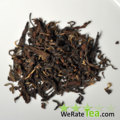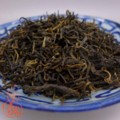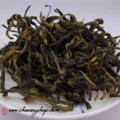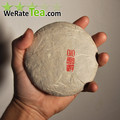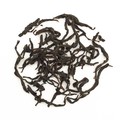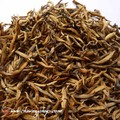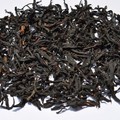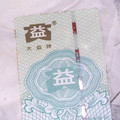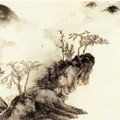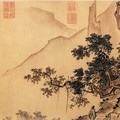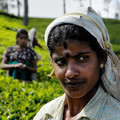Red tea - Yunnan
Tea by type
Tea by region
Tea by years and other
2015 Yunnan Yi Wu Zheng Shan Ye Sheng Hong Cha
 0 reviews
0 reviewsmimořádně zajímavý čerstvý (sklizeň říjen 2015) červený čaj sklizený z divoce rostoucích čajovníků starých 40 – 80 let v okolí vesnice Luo Shui Dong v pohoří Yi Wu. Zcela svébytný a velmi vzácný červený čaj (vyrobeno pouze 15 kg), nádherně snoubící charakter divokých čajovníků, čajů z Yiwu a těla a sladkosti červených čajů. Cena při rezervaci předem je 277,-/50 g, k dispozici pouze 3 kg.
2015 Jingmai Sheng Tai Hong Cha - Red Tea from Jingmai 50g
 0 reviews
0 reviewsThis lovely red tea come from Jingmai area in Lancang and spring harvest. Perfect processing, good quality tea trees betwen 60-100 years old growing naturaly in the forest. Most of tea trees are "Zhong ye zhong", rarely xiao ye zhong or Da ye zhong which give to this rare red tea very original chracter. The tea is full in body, sweet, with tones of honey and dark chocolate.
2014 Autumn Mengsong Old Tree Organic Red Tea
 0 reviews
0 reviewsThis tea come from Mengsong area and single mountain and autumn late September harvest. Nowadays the old tree or gushu red tea is very popular. Most of these teas in the market have one problem. The processing is very bad. Our friend who is experienced puerh tea producer in Menghai invited an Fengqing red tea maker to help him make good red tea from their organic old tree garden. Trees in this mountain have 80-200 years and grown wild in the forest. This tea have heavy honey aroma, dark...
2013 Chawangpu Xiao Jin Bing Red Tea 100g
 1 review
1 reviewThis small red tea cake is made from 2012 spring harvest Simao high mountain material. Carefully pressing in Menghai , simple white wrapper. 10 cakes are packed in bamboo tong. Nice dark chocolate fragnance, smooth and sweet with hint of honey.
2013 Wuliang Wild Hongcha
 2 reviews
2 reviewsThis tea is collected from ancient, wild trees on Wuliang mountain. These are truely wild trees, that haven't been planted by humans and average around 800-1000 years old. The leaves naturally have honey like characteristics in the taste and aroma, which lends them very well to being made into hongcha (Red/Black tea). I find it difficult to get excited by many hongcha - the oxidisation often seems to mute many of the characteristics of teas that I find most enjoyable. This one...
2013 Jinggu Da Bai Hao Hong Cha
 1 review
1 reviewJinggu area, it's famous for one of varietal tea trees – Da Bai Hao – “Big White tomentum”. The tea leaves and buds with dense white tomentum are larger than other tea variety. Its delicate aroma is sweet and appealing, its taste is thick mellow and unforgettable. This is one of highest Yunnan black tea production - first harvest, hand picked and highly selective process. Pleasant taste of Yunnan Hong Cha (black teas). The dry material - hairy aromatic long buds. Rich flavorful...
2013 "Light Roast" Wild Tree Purple Varietal Black Tea of Dehong
 1 review
1 reviewThis is a lightly processed black tea that was hand-crafted using a wild tree purple leaf varietal from Dehong prefecture. Ye Sheng "野生“ varietal aka "Camellia sinensis (L.) Kuntze var. assamica (J. Masters) Kitam." is a primeval varietal that pre-dates Camellia Sinensis var. Assamica and is a naturally occuring non hybridized varietal. It's potency in cha qi arises from it's unadulterated nature. It is naturally bug repellent, grows wild in the forests of Yunnan at an altitude of 1600-2200...
Theme
Quotes
„The first flush takes place in late April to early May. The second harvest usually takes place from June through July, and the third picking takes place in late July to early August. Sometimes, there will also be a fourth harvest.“
Latest posts
07.06.2025 @ 07:48:53 - lalo233:
The unforgiving landscapes of Arrakis in Dune: Awakening demand a mastery of combat....
07.06.2025 @ 07:48:50 - lalo233:
The unforgiving landscapes of Arrakis in Dune: Awakening demand a mastery of combat....
01.01.2016 @ 18:14:35 - Eternal Spring:
WeRateTea.com wish you all the best for 2016!...
07.12.2015 @ 09:07:02 - sypalino:
I decided to taste this tea 2 weeks after delivery. The cake is lightly pressed, so...
09.11.2015 @ 21:58:19 - Eternal Spring:
Comparison of 2013 Bada Pu-erh.sk with <a...
09.11.2015 @ 09:34:07 - Eternal Spring:
Lao Yu 2013 is now about 2,5 years old tea and out of this 1,5 year stored in Europe....
09.11.2015 @ 09:33:11 - Eternal Spring:
Comparison of all three Lao Yu is now done :)
15.10.2015 @ 11:06:37 - Eternal Spring:
2015 Chawangpu Collection – I can only tell, that all teas are very good :)
09.10.2015 @ 10:31:19 - Eternal Spring:
It was quite long and difficult tasting to make a decision… There is still quite...
24.01.2015 @ 16:55:57 - Eternal Spring:
WeRateTea.com wish you all the best for 2015!...
Tea by region
We will help you with tea selection.
Do you like quality loose tea?
We will help you to find the right one for you. Be inspired by tea ratings of other tea lovers. Rating stars could help you.


Review your cup of tea.
Review the tea you are drinking and help other tea lovers to find the right cup of tea.






 Shops
Shops
